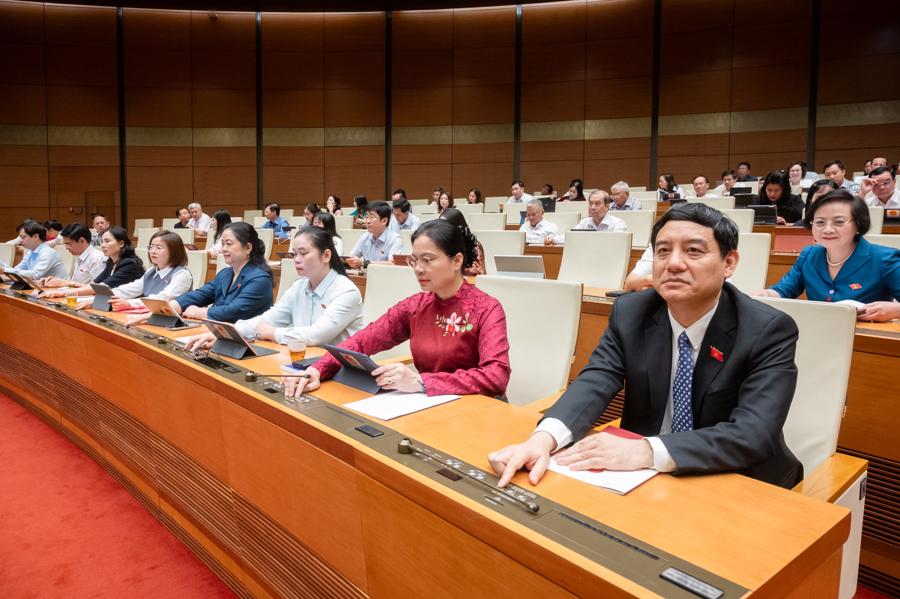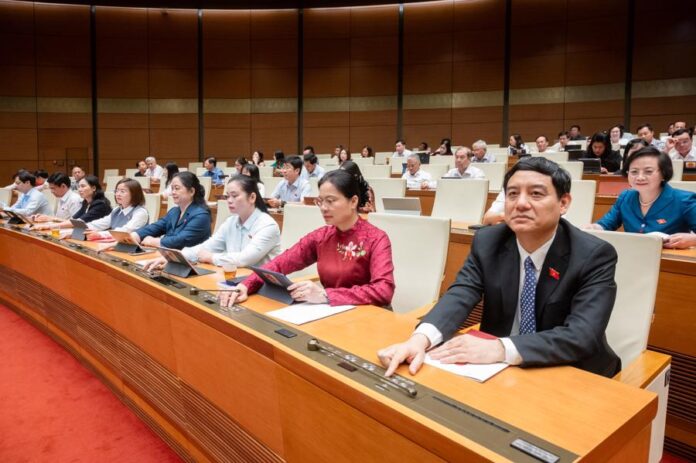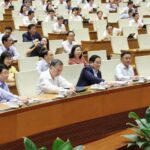On the morning of June 16, the National Assembly passed the Amended Labor Law with the majority of delegates voting in favor. Before the National Assembly voted to pass the law, on behalf of the Standing Committee of the National Assembly, Mr. Nguyen Dac Vinh, Chairman of the Committee for Culture, Education, Teenagers, and Children, reported on the explanation, reception, and editing of the Amended Labor Law draft.
**THE UNEMPLOYMENT BENEFIT RATE OF 60% IS APPROPRIATE**
Regarding the monthly unemployment benefit rate, Mr. Nguyen Dac Vinh said that some suggestions proposed increasing the monthly unemployment benefit rate to a minimum of 65%, and allowing the government to adjust it to a maximum of 75% in the event of a large-scale economic crisis or pandemic.
Some suggestions proposed increasing the rate to 70% but not exceeding five times the regional minimum wage, and for every six months of unemployment insurance contribution, one month of unemployment benefits should be given, but the maximum should not exceed 12 months.
The Standing Committee of the National Assembly has directed a review and found that the Unemployment Insurance Fund’s surplus in the past has mainly been accumulated from the previous period, supported by the annual state budget. At that time, the number of beneficiaries of the regimes was still small. However, from 2020 up to now, unemployment insurance contributions and expenditures have been balanced annually.
According to the experience of countries that have successfully implemented unemployment or employment insurance policies (Canada, South Korea, Japan, Thailand, etc.), and international standards on unemployment insurance, the unemployment benefit rate should not be less than 45% of previous income, or less than 45% of the prescribed minimum wage or the normal worker’s wage, but not less than the minimum basic living standard. The minimum period for receiving unemployment benefits is 12 weeks (3 months) within a 12-month period.
On the other hand, the Labor Code (Articles 47 and 48) stipulates the responsibility of employers in paying severance pay to employees who have worked regularly for at least 12 months.
Accordingly, for each year of work, employees are entitled to half a month’s salary (50% of the salary). At the same time, employers are responsible for providing job loss benefits to employees who have worked regularly for them for at least 12 months, with one month’s salary (100% of the salary) for each year of work, but at least equal to two months’ salary (a minimum of 200% of the salary).
The Standing Committee of the National Assembly believes that the rate of 60% of the three-month average wage for unemployment insurance contributions is relatively appropriate, taking into account international practices and the current levels of benefits that employees receive when they lose their jobs.
“This rate ensures that workers can overcome difficulties and stabilize their lives during unemployment until they find new jobs; it is in line with the principle of contribution and benefit, and the ability to balance the receipts and expenditures of the Unemployment Insurance Fund,” said Mr. Nguyen Dac Vinh, Chairman of the Committee for Culture, Education, Teenagers, and Children.
**EMPLOYMENT SUPPORT POLICIES DO NOT DISCRIMINATE AGAINST ANY LABOR GROUPS**
Regarding the state’s employment policies, Mr. Nguyen Dac Vinh said that some suggestions proposed adding regulations to support employees who are officials, civil servants, and public employees affected by the reorganization of the political system.
At the same time, support should be provided to overseas Vietnamese and foreign workers in Vietnam, employers with a large number of employees in local, rural, and mountainous areas, and those with a large number of employees with disabilities.
Some suggestions also proposed adding more specific and detailed regulations, including criteria for identifying flexible workers, suitable for jobs without employment relationships, etc.
Regarding the above content, the Standing Committee of the National Assembly believes that the draft Law stipulates employment support policies for all workers, without discrimination.
Support policies for people with disabilities, overseas Vietnamese workers, officials, civil servants, and public employees affected by the reorganization of the political system have been stipulated in other Laws.
These include the Law on Supporting Small and Medium Enterprises in 2017, the Law on People with Disabilities in 2010, the Law on Vietnamese Guest Workers in 2020, laws on officials, civil servants, and public employees, labor laws, laws on vocational education, tax laws, and other relevant legal documents.

Regarding the subjects of policy loans to support job creation, some suggestions proposed expanding or prioritizing lending to enterprises and production and business facilities that employ many female workers or are owned by women; those that employ many older workers; and startup and innovative enterprises.
Some suggestions proposed expanding the subjects eligible for preferential loans to support job creation, job retention, and expansion, as well as working abroad. This includes people from households that have recently escaped poverty, people from near-poor households, ethnic minorities from poor households in particularly difficult areas, freelance workers, informal workers, and workers on digital platforms, among others.
Receiving the opinions of the National Assembly deputies, the draft Law has been edited to assign the Government, based on the socio-economic situation and the need for lending to solve employment problems, to decide on expanding the subjects eligible for loans with lower interest rates.
Regarding the Law’s effectiveness, Mr. Nguyen Dac Vinh said that the draft presented by the Government did not initially propose an effective date. During the discussion process, no National Assembly deputy gave an opinion on this content. In document No. 503/CP-KGVX dated June 10, 2025, the Government proposed that the Law take effect from April 1, 2026.
The Standing Committee of the National Assembly believes that the effective date of the Law from January 1, 2026, would be more appropriate, promptly promoting the effectiveness of the new policies in the Law and bringing practical benefits to workers, in line with the spirit of promoting institutional reform in law building.
Therefore, the Standing Committee of the National Assembly directed the addition of the effective date of the Law from January 1, 2026.
The Amended Labor Law draft, after being reviewed, received, edited, and perfected, consists of 8 chapters and 55 articles (a reduction of 3 articles compared to the Law draft presented at the beginning of the 9th session).
Compared to the current Law, the draft Law has 12 new groups of points, ensuring that it meets the goal of amending the Law, closely follows the direction of renewing thinking in lawmaking, and fully satisfies the conditions for submission to the National Assembly for consideration and approval at this session.
The Constitution Amendment Passes in Congress, County-Level Operations Halt from July 1st
With the recent resolution passed by the National Assembly, the Prime Minister will now directly appoint the chairman and vice-chairman of the People’s Committees in the provinces and centrally-run cities formed after the reorganization.
The Congress Passes Resolution to Amend the Constitution: County-Level Operations to Cease from July 1st, 2025
The National Assembly’s resolution to amend and supplement several articles of the 2013 Constitution stipulates the cessation of district-level administrative units across the country from July 1, 2025, onwards. Additionally, it affirms the status of the Vietnam General Confederation of Labour, the Vietnam Farmers’ Union, the Ho Chi Minh Communist Youth Union, the Vietnam Women’s Union, and the Vietnam Veterans Association as socio-political organizations under the umbrella of the Vietnam Fatherland Front.
Establishing a Two-Tier Local Government Model Across the Nation
The formulation of the Law on Local Government Organization (amended) carries immense historical significance. It lays down a robust legal foundation for the organization and operation of local governments, marking the inaugural establishment of a two-tier local government model in Vietnam.








































